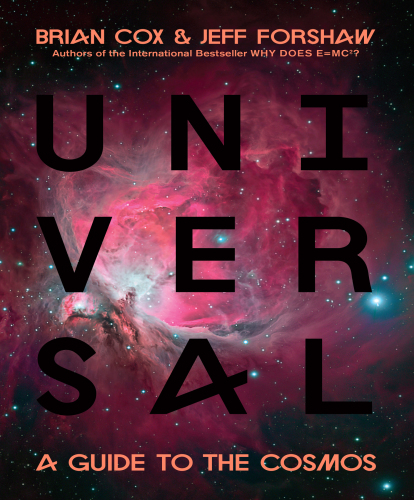
Universal
A Guide to the Cosmos
کتاب های مرتبط
- اطلاعات
- نقد و بررسی
- دیدگاه کاربران
نقد و بررسی

Starred review from January 23, 2017
Acclaimed British physicists Cox and Forshaw (The Quantum Universe) team up once again in this accessible, lucid, and entertaining introduction to cutting-edge astrophysics and cosmology. Revealing how scientists explore the universe, the authors celebrate the scientific method as much as the scientific discoveries they address. They begin close to home, asking “How old is the Earth?” That simple question leads naturally through discussions of plate tectonics, atomic structure, and radioisotope dating while demonstrating the roots of the scientific method: observing and collecting evidence, and applying logic to reach conclusions. From here, it’s smooth sailing through increasingly complex topics. Determining astronomical distance introduces such concepts as Cepheid variable stars, supernovas, and redshift. Pondering the Earth’s weight leads to measuring gravity with a watch, a ball, and a ruler. The authors also proffer an inventory of the universe and dig into the mysteries of dark matter and dark energy. At the book’s core are the Big Bang and considerations of relativity theory, gravity, and curved spacetime. The minimal-math approach progresses from simple to complex ideas, and detailed diagrams and colorful photographs help illuminate concepts. Curious readers will appreciate how Cox and Forshaw celebrate the scientific process as heartily as they embrace the wonder of the universe. Illus.

February 1, 2017
Two physicists lead a tour of our universe and explain how we can better understand it by "doing science."Authors who take on cosmology have a difficult job. Many concepts (relativity, quantum phenomena) are complex, and even familiar ones, like gravity and light, need at least a little mathematics to make sense. Since equations are often considered the kiss of death regarding sales to general readership, popular science writers traditionally assure readers that none will sully their texts. Even in skilled hands, the simplification and/or absence of math converts much of cosmology into a magic show. Although they're entertained, readers must accept many phenomena on faith. This is not a problem since few creationists read these books, but TV commentator Cox (Particle Physics/Univ. of Manchester) and Forshaw (Theoretical Physics/Univ. of Manchester), who have co-authored multiple books, including The Quantum Universe (2012), refuse to take that approach. The authors not only describe what cosmologists have learned over the centuries, but how they proved it, and there is no shortage of math. As they note, "anybody, standing in their back garden with a reasonably sized amateur telescope...can prove that we live in an expanding Universe and measure the rate of the Universe's expansion." Readers willing to make a modest effort and use their high school algebra can confirm that examining the present universe makes it clear that it began with the Big Bang. Calculating when this happened is not difficult, but determining how everything--i.e. space, time, matter, and energy--evolved takes some thought. Fortunately, plenty of brilliant scientists, led by Einstein (a big favorite of the authors), gave it close attention. Many readers will settle for the magic show, but those who choose to pore over the authors' explanations and perhaps take a pencil and paper to follow along will gain a more significant understanding of some profound cosmological phenomena.
COPYRIGHT(2017) Kirkus Reviews, ALL RIGHTS RESERVED.

























دیدگاه کاربران